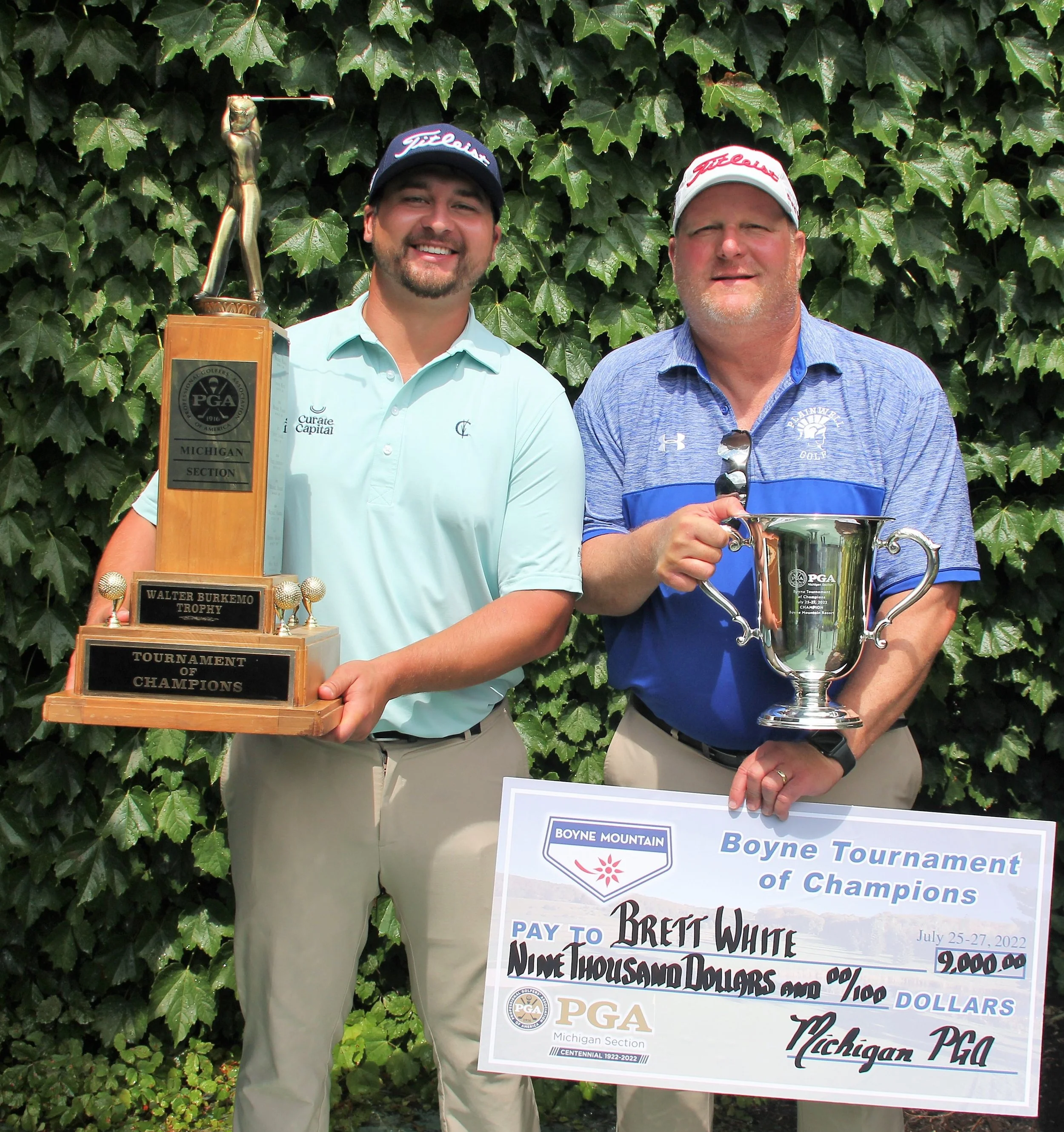Michigan’s Brett White: More than You Know
White is one of 10 young pros the general public can invest dollars in with Carry
Editors note: Carry is a unique fan engagement platform for supporting "early-stage" professional golfers. Carry founder Donnie Dotson’s program has made it possible for fans of golf to invest in 10 professional golfers in exchange for unique access, "brag-worthy" experiences, and potential returns. Dotson’s background includes business development and investing roles at Sportradar and Goldman Sachs, and as a former Marine and CIA-trained Operations Officer within the US Intelligence Community. Brett White won the 2020 Michigan Open at Grand Traverse Resort, and the 2022 Tournament of Champions at Boyne Mountain.
Brett’s story as told to Jordan Perez
A lot of people have seen my name recently since my comeback from a huge health scare. Though I’m proud of what I’ve overcome, that’s not my entire story.
Growing up in west Michigan, hockey was the first sport I loved, but golf caught my eye when the weather complied. My dad was a physical education teacher and had the summers off, which he spent driving me and my sister (Sarah, also a pro golfer) to golf tournaments. I started beating older kids, and my biggest strength was being a pretty powerful long-hitter compared to my peers.
Still, I would have told you that hockey was my favorite sport. My potential in golf started to unveil itself once the recruiting process began and I saw some offers. I ended up committing to Eastern Michigan.
When I got to Ypsilanti, I was quickly humbled.
I had a lot of raw talent, but I didn’t know a whole lot about course management. I got my butt whooped in my first two years and being competitive, I hated losing. I started reading golf books, understanding ball flight and trackman, and focusing on what made good golfers great. My last two college seasons were decent, but after seeing a steady improvement in my scoring average year over year, I decided to turn professional after my graduation in 2016.
It’s since been seven crazy years professionally, but the year that followed turning pro was probably the extreme. I played the first half of 2017 on the Latinoamerica Tour. I was back in the states, and suddenly, in a matter of 10 days, went from losing a playoff in the New Hampshire Open to needing help just to walk. I came down with a bad bout of mono that didn’t seem to let up, and after a few tests, I was diagnosed with viral encephalitis.
There were many days when I could only spend 30 minutes out of bed, leaning against and grabbing walls. My motor skills and speech were severely impacted due to my brain swelling up. I spent 13 days in the hospital. After those 13 days, I was able to walk on my own which really showed me the light at the end of the tunnel. As soon as I could stand up, I started trying to play golf again – but it took me about two months before I could even break 100.
By my side that entire time was my wife, who I had met in college. She was a gymnast at Eastern Michigan University and understood how competitive I was. She pushed me through my rehabilitation and never let me make excuses. She is a big reason for the success of my recovery, and through this process I knew she would be the person I would spend the rest of my life with. I underwent 10 to 12 weeks of outpatient therapy, and it took about six months before I felt normal again.
I was back to grinding on mini-tours from 2018 onward but was able to play Korn Ferry Tour Q-School in 2021 and took 28th place at final stage. That was good enough for my first full season on the Korn Ferry Tour (2022), where I made nine cuts – and missed five cuts by just one stroke. I wound up back in Q-School to finish 74th in Final Stage, allowing me conditional status for this season.
But I’ve been in worse places, and there’s no point in feeling sorry for myself. There’s nothing else to do but keep improving. After losing full Korn Ferry Tour status, I Monday qualified for my first-ever PGA Tour event at the Waste Management Phoenix Open in February. I ended up missing the cut, but that week really validated the fact that I belong out there. It lit a new fire under me – I must get back to the PGA Tour. I’m really proud of myself and how I’ve fought to get to where I’m at, but I have higher standards and goals for myself.
To be one of the few chosen this year by Carry from a deep pool of applications is to know that someone really believes in me. I can give myself every opportunity possible to get back onto the Korn Ferry Tour full-time and eventually the PGA Tour. Monday qualifiers are all over my schedule.
Dozens of guys like me go home empty-handed every week with plenty of expenses, and the handful who advance are still in a hole until they make the cut. So much of my time in golf has been a lot of picking and choosing my opportunities and working an array of jobs just to get them ever since I was 15.
I hope by the end of my career, people will know me more for my golf rather than my health struggles. Carry is giving me that chance to return to the PGA Tour and to show the world how good my game is, and I’m ready to take it.
Learn more at https://www.invest.carry.golf or on Instagram @knowyourcarry.



